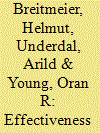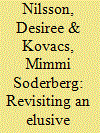| Srl | Item |
| 1 |
ID:
110267


|
|
|
|
|
| Publication |
2011.
|
| Summary/Abstract |
This article uses quantitative methods to deepen and broaden our understanding of the factors that determine the effectiveness of international regimes. To do so, we compare and contrast the findings resulting from two major projects: the Oslo-Seattle Project and the International Regimes Database Project. The evidence from these projects sheds considerable light on the determinants of regime effectiveness in the environmental realm. Clearly, regimes do make a difference. By combining models and data from the two projects, we are able to move beyond this general proposition to explore the significance of a number individual determinants of effectiveness, including the distribution of power, the roles of pushers and laggards, the effects of decision rules, the depth and density of regime rules, and the extent of knowledge of the relevant problem. We show how important insights emerge not only from the use of statistical procedures to separate the effects of individual variables but also from the application of alternative techniques, such as Qualitative Comparative Analysis (QCA), designed to identify combinations of factors that operate together to determine the effectiveness of regimes. We use our results to identify a number of opportunities for additional research featuring quantitative analyses of regime effectiveness. Our goal is not to displace traditional qualitative methods in this field of study. Rather, we seek to sharpen a set of quantitative tools that can be joined together with the extensive body of qualitative studies of environmental regimes to strengthen our ability both to identify patterns in regime effectiveness and to explore the causal mechanisms that give rise to these patterns.
|
|
|
|
|
|
|
|
|
|
|
|
|
|
|
|
| 2 |
ID:
110268


|
|
|
|
|
| Publication |
2011.
|
| Summary/Abstract |
In a seminal article, Stedman (International Security, 22, 1997, 5) suggested that the greatest source of risk to civil war peace processes comes from so-called spoilers, leaders, and groups that perceive peace as threatening and use violence to undermine attempts to achieve it. The spoiler concept has since gained significant ground and widespread legitimacy both in the academic literature and in critical policy circles. In the footsteps of this development, however, we suggest that the spoiler concept has been stretched beyond its original meaning and given raise to a number of ambiguities concerning its definition and empirical applicability. This lack of clarity in regard to some of the key aspects of the spoiler concept does not only risk undermining the usefulness of the concept itself, but also risks hampering the accumulation of valuable research on this pertinent topic. This article presents a reflection on a burgeoning research field and aims to contribute to the same by attempting to offer greater conceptual clarity in regard to a number of issues that are the core of the spoiler debate and by presenting a conceptual framework for analyzing spoilers in future research.
|
|
|
|
|
|
|
|
|
|
|
|
|
|
|
|